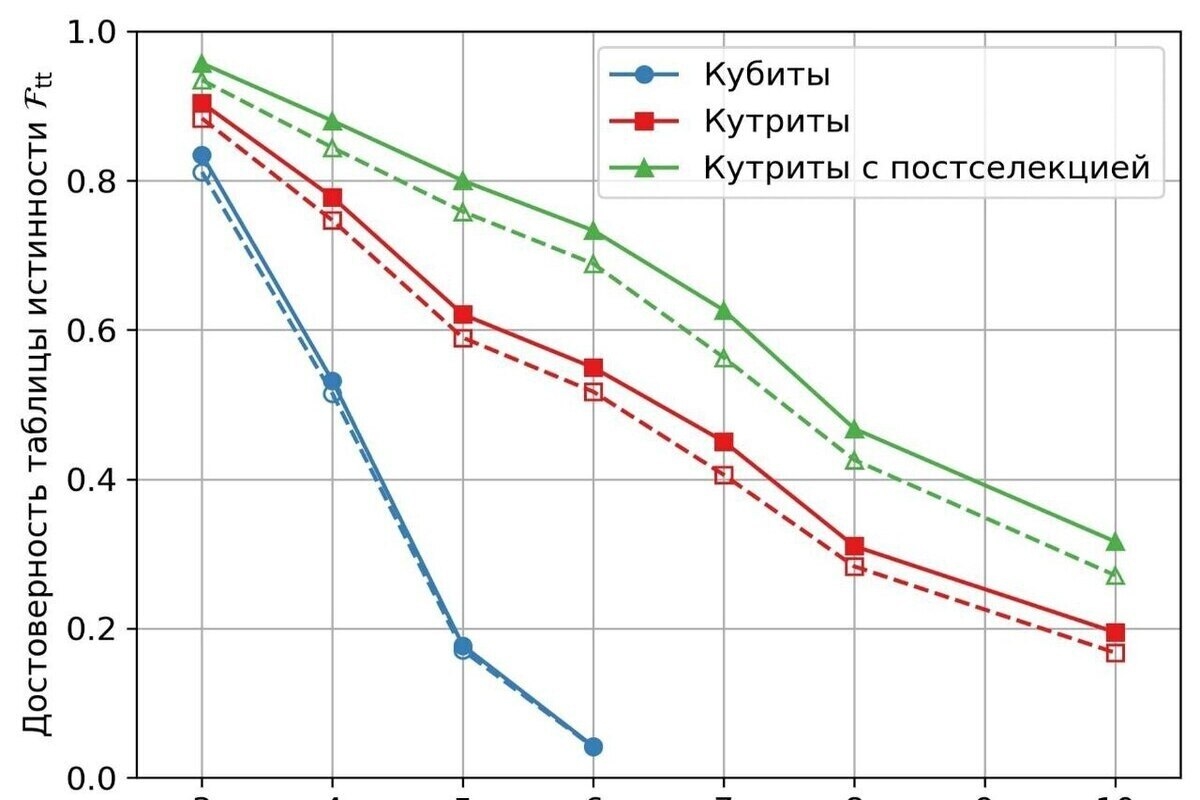Russian scientists set a world record in quantum computing.

There are people who still consider quantum technologies akin to alchemy or even esotericism, and generally don't believe in them. Meanwhile, quantum technologies are one of the main topics in the head of state's discussions with the heads of state corporations and the Russian Academy of Sciences, along with microelectronics, new materials, and space exploration. This means they do have some merit, and we need to understand, at least in a rather simplified sense, what they are.
Indivisible "wave-particle"
Reference books tell us that a quantum is the smallest, indivisible portion of a physical quantity, such as energy or light. That is, a quantum of light is a single photon, a quantum of matter is an atom, a quantum of charge is the charge of an electron... Quanta behave both like particles and like waves, possessing the property of existing in several states simultaneously. For example, an electron in an atom does not have a fixed trajectory of rotation around the nucleus, like a planet around the Sun. We can measure its energy or velocity, but we cannot pinpoint its location without destroying its state.
This state of uncertainty is called superposition. To illustrate this principle, Austrian physicist Erwin Schrödinger proposed a thought experiment in the mid-1930s: a cat is placed in a dark box with a deadly poison, which could, with some probability, either work or not. Therefore, until the box is opened (that is, the system is stopped), we don't know whether the cat is dead or alive, and therefore it is in a "alive-dead" superposition.
Another fundamental feature of quantum mechanics is quantum entanglement. This means that the states of two or more particles can be so tightly interconnected that they cannot be described separately, regardless of the distance between them. They "sense" each other, so to speak, across a large distance, and a change in one particle immediately entails a change in the other. A very rough example of this principle is socks. Imagine you bought a new pair of indistinguishable socks at the store. You give one sock to a friend who goes to Vladivostok, and keep the other. How do you know which sock ended up in Vladivostok—the left one or the right one? You'll never know until you perform a specific action with your own sock—that is, put it on. If you put your sock on your right foot, then in Vladivostok, it will automatically be your left sock.
The principles described are used to create a quantum computer. For example, in a classical computer, the fundamental unit of information is a bit, which can only be in one of two states—"0" or "1" ("off" or "on"). In a quantum computer, the equivalent of a bit is a qubit, which can be not only in the "0" or "1" state but also in a superposition of both, that is, simultaneously representing both values with certain probabilities. Using superposition and entanglement, quantum computers are theoretically capable of solving certain problems significantly faster than the most powerful classical supercomputers.
Will the binary system disappear?
Although the idea of quantum computing was first proposed in 1980 by Soviet scientist Yuri Manin and American Paul Benioff, the quantum race only began in 2018 (Russia joined in 2020). As developers say, the concept of a "quantum computer" is still in its infancy and will require a great deal of time to mature.
However, many are already declaring that, once fully developed, this miracle of technology and human thought will differ more from modern abacus technology than a modern computer does from... an abacus. While a wooden abacus and our everyday PC are, after all, links in the same binary system, quantum abacus technology will be significantly different, allowing humans to enter a completely different realm of problems and solutions, just as the creation of the spacecraft once allowed us to leave Earth and enter space. Let's now recall what percentage of people at the dawn of the space age believed this would ever happen?
It is expected that the "space" acceleration of computations on a quantum computer will help create personalized medicines, unravel the secrets of the brain, and create the most reliable data protection systems, i.e., encryption. However, a quantum computer will not replace the one on which this article was written. Why? Because it will have different tasks, beyond the capabilities of a conventional computer, just as the tasks of a space rocket extend beyond the capabilities of our terrestrial high-speed train.
Computing Architects
The development of quantum computers based on four different quantum platforms simultaneously is currently considered promising: neutral atoms, photons, superconductors, and ions. Russia, as a leading country in this field, is also pursuing these areas. Experts are confident that this diversity will enable us to achieve maximum results in various areas of computing. It's also possible that over time, one of these development approaches will become a dead end, or that a new promising direction will emerge.
The most advanced technology today is considered to be the creation of qubits based on superconducting circuits. The record-holder in this class is IBM's 1,121-qubit Condor quantum processor.
But the number of qubits alone, says Ilya Semerikov, developer of the Russian 50-qubit ion quantum computer, doesn't tell us much. In a quantum computer, computational quality and error minimization are especially valuable, and in these respects, our computer is almost as good as the 1121-qubit one. However, achieving the accuracy of the 56-qubit ion quantum computer Quantinuum H2-1 will require some work.
According to Semerikov, the Russian computer uses a chain of ytterbium ions as qubits. Ion qubit technology is based on the use of electromagnetic fields to trap individual ions in space. These particles are "suspended" in a trap and remain virtually motionless, which reduces external interference and allows their quantum state to be maintained for a relatively long time. In the ion trap, the particles are cooled to near absolute zero, and their state can be manipulated using laser pulses. The sequence of these pulses forms the basis of quantum algorithms.
So, the Russian computer has fewer qubits than the American one, but this small number of units of information is offset by the high reliability of operations. FIAN researchers tested an original idea, using not a simple qubit (two-level quantum system) but a four-level one—a qudit system—as a single unit of computation, which is 2 to 6 times more efficient, depending on the underlying computational algorithms.
Champions of subtle states
For some algorithms, this particular architecture proved more advantageous, leading our scientists last year to implement so-called Grover algorithms, which offer a significant acceleration of algorithms for searching unsorted, unordered databases. In the experiment, they trained a neural network to sort handwritten images of digits using a quantum computer.
More recently, scientists at the Physics Institute distinguished themselves by being the first in the world to demonstrate a multi-qubit entanglement operation, the "Toffoli gate," on their quantum computer, with the maximum number of qubits. This was recently reported in the prestigious physics journal Physical Review Letters.
MK Reference: The Toffoli gate is a quantum logic element, a "lever" that acts on three qubits (quantum bits). It changes the state of the third qubit only if the first two qubits are in the "1" state (that is, display the correct value). Otherwise, it does not change the third qubit and has no effect on the first two.
"It was a generalized multi-qubit logical operation on 10 qubits," explains Ilya Semerikov. "To date, it's the largest such operation documented in the global scientific literature. This gate (or 'lever') applies to several quantum algorithms at once, including the error correction algorithm. And what we demonstrated is largely thanks to our theoreticians from Alexey Fedorov's group; they devised a way to use multi-level quantum systems to perform this multi-particle operation, say, in 10 steps instead of 100.
– How powerful have quantum computers already proven compared to conventional ones?
– Not at all... There are no useful tasks yet in which quantum computers outperform classical ones. This is the result that scientists around the world are striving for today.
– But I read about new cancer drugs, for example, that are already being discovered using quantum computing...
For now, we're talking about quantum computers performing a specific calculation toward a final goal. These are pilot projects for now, to learn how to work with quantum computers. Let me give you an analogy: you have a machine that can count from 1 to 100 well, and I come to you with another one that can only count to 3, but very quickly. They say, "Okay, increase its power by 30 times, and then we'll see if it can count to 100." That's the level of our quantum computers today.
Artificial intelligence, another promising technology, seems to have advanced much further. Will efforts to create a "mature" quantum computer be in vain?
"Certainly, AI is currently showing very good results. In terms of creating drugs and complex chemical compounds, neural networks are currently showing much better results. We also use them to optimize our quantum computer. But there is a difference: AI only works when there's a large sample, a specific database, and it only needs to "guess" and "complete" the picture the customer—the human—is expecting. A quantum computer, however, can operate without any initial data or prior training.
– But what allows us to believe in its future possibilities?
"By and large, a quantum computer is still surprising in itself. Many, even among developers, still don't understand how it can perform even simple calculations! The world record we demonstrated with Toffoli's algorithm is an important result on the path to real practical applications in the future. A quantum computer should assist a classical computer in solving potentially more complex problems, such as modeling fundamentally new materials and chemical compounds, complex logistics, and energy. Algorithms for such problems are known, but for them to work, a quantum computer must become several orders of magnitude more powerful than it is today. Quantum theorists and algorithmicists are also continuing their work, and I hope we will soon see new classes of quantum algorithms."
mk.ru





